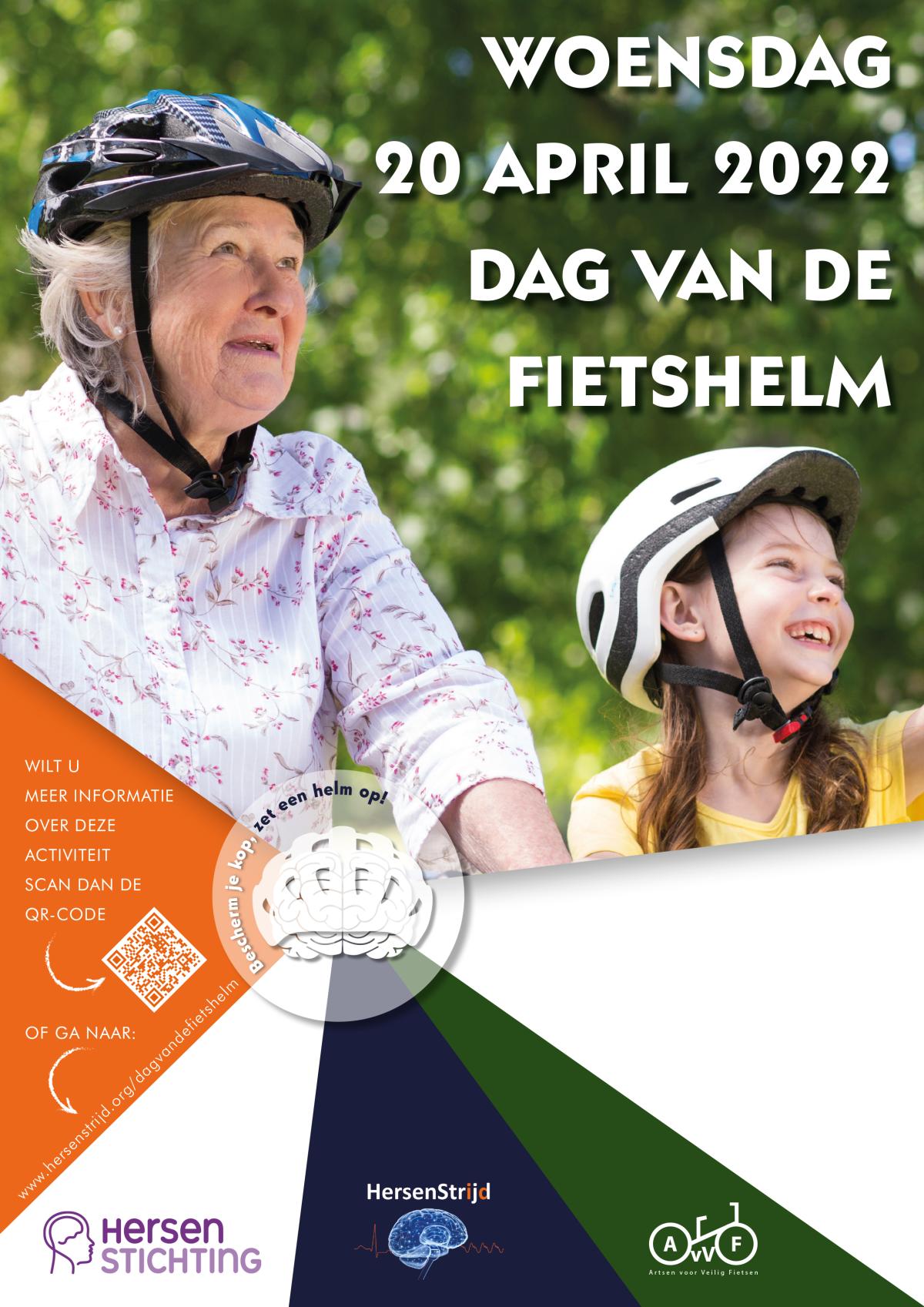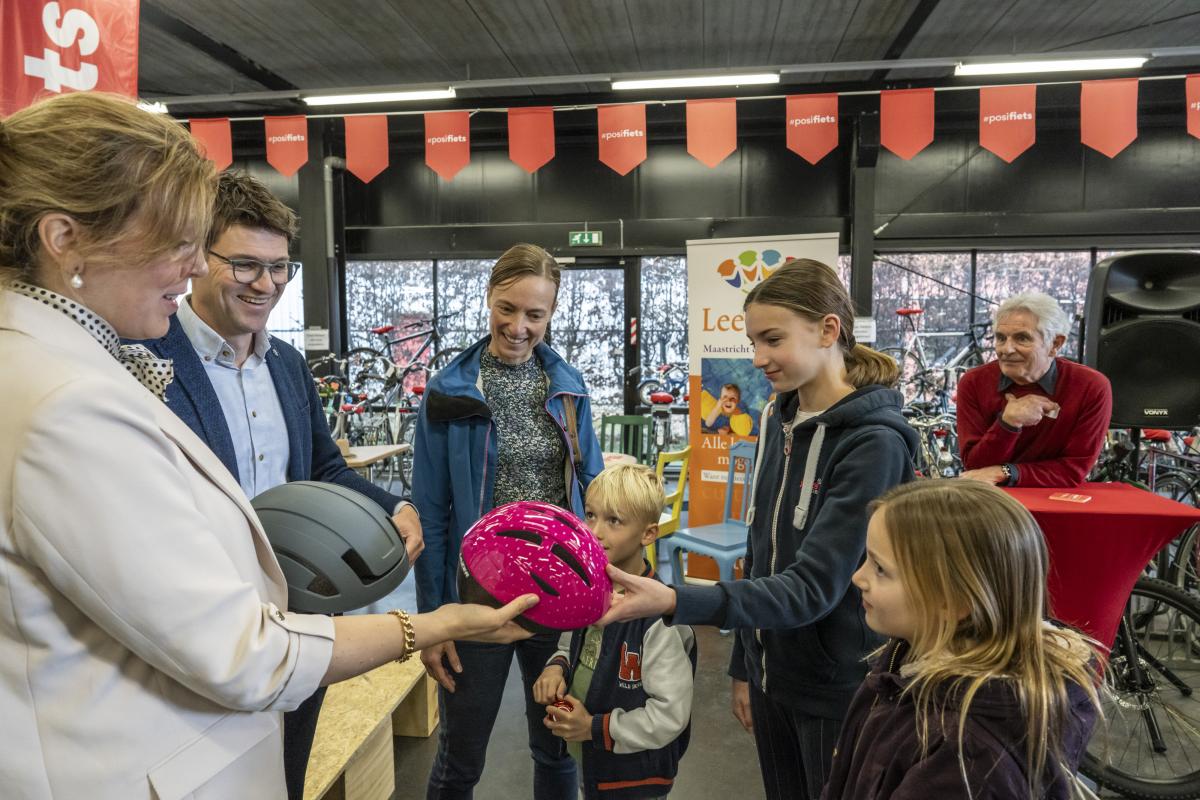Initiative details
In the Netherlands cycling is the most important way of daily transportation. Sadly, over the past 10 years the amount of bicycle casualties in the Netherlands has increased by 40%, which is expected to increase even more by the popularity of the E-bike. In 2023, 71.000 cyclists were treated in hospitals (60% of all traffic casualties) with 12.500 having traumatic brain injury (16%). Traumatic brain injury often leads to permanent disability as neurons have no or just little recovery potential. A very simple and effective intervention is the voluntary promotion of bicycle helmet with estimated reduction of death 70% and brain injury by 60%. In Denmark, voluntary promotion of bicycle helmets has been very effective in reducing the amount of casualties, especially in children. When we started in 2022 with the first National Day of the bicycle helmet only 2% of the Dutch cyclists were wearing helmets.
Initiative date
Who was/is your target audience?
Policy makers
Public authorities
Children 0-16
Young adults 17-25
Adults
Parents
Seniors
Company employees
Emergency services
Cyclists
Topic
Create awareness
Organisation details
Doctors of safe cycling and Brain Battle Foundation (HersenStrijd)
Association
Netherlands
Meerssen
Contact name
Marcel Aries
Telephone number
0031618473155
mjharies@yahoo.com
Website link
Project activities
If you work together with external partners, list the most important partners and briefly describe their role.
Over the years our group of collaborators and external partners has increased massively.
- Patient organisations like Brain Battle foundation and HersenStichting. Very important as they represent the casualties and stress the dramatic effect of life-long brain damage.
- Governmental organisations that promote and evaluate the Dutch traffic ‘Veilig Verkeer Nederland’. They develop educational material and banners for children going to school.
- Insurance companies. They also noticed the major increase in bike casualties over the years in their insurance claims. They have a lot of experience with national campaigns regarding alcohol (BOB campaign) and distraction (MONO campaign) effects in daily traffic. We worked together in advising the ministry of Infrastructure and Water management in their bicycle safety strategy.
- Bike helmet companies. We worked together with these companies to organise discount promotions for healthcare personal, elderly (in > 6 Dutch provinces) and parents and children (1 Dutch province). We have stressed that these companies should try to improve the safety even further and integrate helmets more into the bicycle (like airbags in cars).
- Ministry of infrastructure and water management. We have advised the officers and the minister Mark Harbers on the voluntary bike helmet promotion strategy that is now offered to the new government in June 2024 as part of the bicycle safety strategy.
- Patient organisations like Brain Battle foundation and HersenStichting. Very important as they represent the casualties and stress the dramatic effect of life-long brain damage.
- Governmental organisations that promote and evaluate the Dutch traffic ‘Veilig Verkeer Nederland’. They develop educational material and banners for children going to school.
- Insurance companies. They also noticed the major increase in bike casualties over the years in their insurance claims. They have a lot of experience with national campaigns regarding alcohol (BOB campaign) and distraction (MONO campaign) effects in daily traffic. We worked together in advising the ministry of Infrastructure and Water management in their bicycle safety strategy.
- Bike helmet companies. We worked together with these companies to organise discount promotions for healthcare personal, elderly (in > 6 Dutch provinces) and parents and children (1 Dutch province). We have stressed that these companies should try to improve the safety even further and integrate helmets more into the bicycle (like airbags in cars).
- Ministry of infrastructure and water management. We have advised the officers and the minister Mark Harbers on the voluntary bike helmet promotion strategy that is now offered to the new government in June 2024 as part of the bicycle safety strategy.
Please describe the project activities you carried/are carrying out and the time period over which these were implemented.
In 2019 we started to promote the bicycle helmet in our own hospitals. The idea was the healthcare personnel should be giving a good example: cycle to work and protect your brain by wearing a good helmet. Most hospital gave discount in purchasing a helmet This action took place a in large number of Dutch hospitals and attracted a lot of media attention. The doctors involved united themselves as ‘Doctors of Save Cycling’ and nowadays we have around 70 active members. Our initiative is supported by nearly all professional medical associations. In 2022 we organised our first National Day of the Bicycle helmet with again a lot of media attention. The focus in 2022 was on organising activities in the different hospital to provide information about the benefits of a good helmet. The day is preceded by the presentation of the number of yearly traffic casualties in the Netherland. We write a press release together with central office of traffic statistics. In 2023, also non-medical organisations decided to join our initiative that boosted the helmet campaign a lot. We organised a symposium with representatives from Denmark and Australia updated us about their strategies: helm legislation and voluntary promotion. In 2024, the ministry of infrastructure and water management invited the Doctors of Safe Cycling supported our annual day and our ideas have been incorporated in a National helmet promotion strategy that is presented to our new government in June 2024.
In terms of implementation, what worked well and what challenges did you need to overcome?
Healthcare personnel proved to be a good starting point for the campaign. We have observed a rise in helmet use from 3% to 15% in our hospitals without a reduction in people cycling to work. Also in 2024 many activities of the annual day were organised around the hospital as we think the awareness still can be improved. We have been involved in research that advises to focus on 3 groups of cyclists who are much open to wear the helm on a voluntary basis: (1) elderly (>55 years of age); (2) commuters and (3) parents and children. The helm promotion strategy of the ministry is also focussing on these groups with their pilot projects. We have noticed a serious increase in elderly wearing bicycle helmets (around 20%). Discount offers were sold out immediately. Parents and children proved to be more difficult, especially the combination. We have noticed that more children <10 years are wearing helmets but there al large regional differences (villages > cities). We are also very worried about the popularity of the electronic Fat bikes as these vehicles are illegally staged and personal protection is forgotten. Very recently a national report in 2024 showed a dramatic increase of young fat bike casualties (between 12-16 years of age). As Doctors of Safe cycling we have advised our government banning fat bikes for children under 16 years of age. Commuters are also important group of cyclist to convince the benefit of cyclist. Our initial conversation with the National Railway service showed limited enthusiasm to offer helmets in combination with loan bikes. But we persevere, together with all our partners.
Evaluation
Please summarise how you have evaluated the initiative’s impact (e.g. social media reach, survey, feedback forms, statistics).
We have noticed that the Dutch media is continuously reporting about the dramatic numbers of bike casualties in the Netherlands. The Day of the Bicycle helmet leads to a major discussion (social media, LINKEDIN, Facebook, talk shows, etcetera) why the Dutch cyclist still find it difficult to wear a simple helmet that protects their most vital organ. In the 2024 annual day also media reporters went to other countries like Denmark and Germany to ask their reasons for wearing helmets. The Doctors of Safe Cycling are very often interviewed or talk show guest to comment on the casualty incidence and interventions that are needed to reduce these numbers. We have noticed that our annual day also have woken up other organisations – like Dutch cycling association and ministry – that cycling safety should have top priority in national policy making and investments should be done in improving infrastructure, risk behaviour, compliance and personal protection (like the bicycle helmet). We have motivated our colleagues from Belgium to organise a National Day of the Bicycle helmet with a lot of awareness and media attention.
What has been the effect of the activities?
Most importantly we have noticed an increase in the number of cyclist wearing helmets. Most obvious in the elderly population so far (increase to 20%). This is already very relevant as we find it important that these people cycle (important health intervention) but because of comorbidities or certain medications (anticoagulation) the effects of falls have extra impact.
We have motivated the ministry of infrastructure and water management to write a bicycle helmet promotion strategy (budget 4-5 million euro) that focusses on elderly, commuters and parents and children. We do our very best that this strategy will be supported (financially) by the House of representatives in Den Hague so the whole year round all kind of helmet promotion campaigns are organised.
We have motivated our Belgium colleagues to organise a Belgium national Day of Bicycle helmet which is immediately supported by famous Belgians like Tom Waes (actor) and Karl van Nieuwkerke (presenter).
We have motivated the ministry of infrastructure and water management to write a bicycle helmet promotion strategy (budget 4-5 million euro) that focusses on elderly, commuters and parents and children. We do our very best that this strategy will be supported (financially) by the House of representatives in Den Hague so the whole year round all kind of helmet promotion campaigns are organised.
We have motivated our Belgium colleagues to organise a Belgium national Day of Bicycle helmet which is immediately supported by famous Belgians like Tom Waes (actor) and Karl van Nieuwkerke (presenter).
Please briefly explain why your initiative is a good example of improving road safety.
Wearing a bicycle probably has an immediate effect as it reduced the impact of a fall on the head. But research of insurance companies also showed that people who wear helmets also changes their overall traffic behaviour. More aware of weather conditions, other road users and speeds, effects of alcohol and distraction. So we really hope that our activities not only lead to helmet use but also changes in behaviour in traffic. We have closely collaborated with the ministry of traffic in Denmark and we used their experience and (sometimes very funny) helmet campaign to convince our ministry.
How have you shared information about your project and its results?
We have constructed a website (www.dagvandefietshelm.nl) that hosts all the activities of the annual Day of the bicycle helmet and all the media attention that came with it. Every year we have made posters and banners to boost our message. In 2024 together with Ministry we have designed a poster campaign that was appreciated by all kind of organisations (like hospital, fire brigades, municipalities, etcetera) with the slogan: As long as your helmet fits properly!! Together with office of traffic statistics we write a press release about the number of traffic casualties and the Doctors of Safe Cycling gained a lot of media attention (estimated advertisement costs of our public performance 0.5 million euros).










